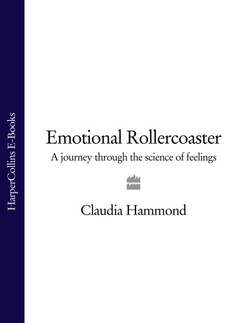Читать книгу Emotional Rollercoaster: A Journey Through the Science of Feelings - Claudia Hammond - Страница 20
a diagnosis of depression
ОглавлениеThe distinction between depression and sadness could be classified as a differentiation created by society. Extreme, prolonged sadness can reach a point where friends and family are unable to help. At that point, as with Chloe, they entreat the person to seek professional help and the symptoms are labelled as an illness – clinical depression. This diagnosis came as a great relief to Chloe, providing her with an explanation for her feelings whilst absolving others of any blame.
Symptoms of clinical depression fall into four categories, but a person doesn’t have to experience all of them for a diagnosis of depression. The most obvious are the emotional symptoms. People are often saddest and most tearful in the mornings, using words like ‘blue’, ‘hopeless’ and ‘lonely’ to describe their mood. It can be accompanied by anxiety and a lack of pleasure in normally enjoyable activities such as eating tasty food or seeing friends. Then there are the physical changes – waking very early in the morning, loss of appetite and loss of interest in sex. The third type of symptom concerns motivation. Depressed people usually find it very hard to get started on projects, or to make decisions.
Finally and most intriguingly there are the cognitive symptoms – those associated with thoughts. Even feeling slightly sad can affect the way a person thinks. This can be illustrated by a simple word experiment: participants listen to either happy or sad music through headphones. Afterwards they sit in front of a computer and letters are flashed up on the screen. This is a standard psychological test called a lexical decision task, where the letters on the screen sometimes form a word and sometimes don’t. The task is to identify the real words as quickly as possible. Those who had been listening to happy music were faster at spotting the words associated with happiness like ‘delight’, while the people who heard sad music identified the sad words like ‘weep’ the fastest. If the way the brain processes words is affected by a temporary music-induced mood then for a clinically depressed person these changes will last much longer. Unfortunately these shifts in thinking can help to maintain a person’s depression.
Depressed people often perceive themselves to be useless and begin to believe that anything that goes wrong must be their fault. Imagine what you would think after you’d accidentally dropped a glass and broken it. If you’re not depressed you might be briefly annoyed with yourself, but as you cleared up the fragments of glass, you would probably console yourself with the fact that it was an accident and that these things happen. A depressed person is more likely to blame themselves, to see it as further proof that everything always goes wrong for them and that it always will. The depressed person looks round for evidence to support their view that everything’s hopeless, while dismissing any good fortune as pure chance. Addressing these sorts of thoughts provides the basis for cognitive therapy for depression.
Chloe found that her depression forced her to stop and take stock of her life. She felt that she had been so happy previously that she hadn’t been sufficiently self-analytical. A tragedy in her life also provided something of a turning point. A few months after starting on Prozac she was feeling slightly better and went to Australia to visit a friend, but became very depressed once more. Then on 12th September 2001 she heard that a friend of hers was missing after the destruction of the twin towers in New York. She flew to New York to help his wife in her search, but he had been killed. For the first time in years, Chloe found that someone else needed her help and she couldn’t be the sad person anymore. After five weeks in New York, helping her friend to arrange a memorial service, she realised that she was able to deal with practicalities and, despite her grief, she found that she could do something she had not done for a long time – laugh.
